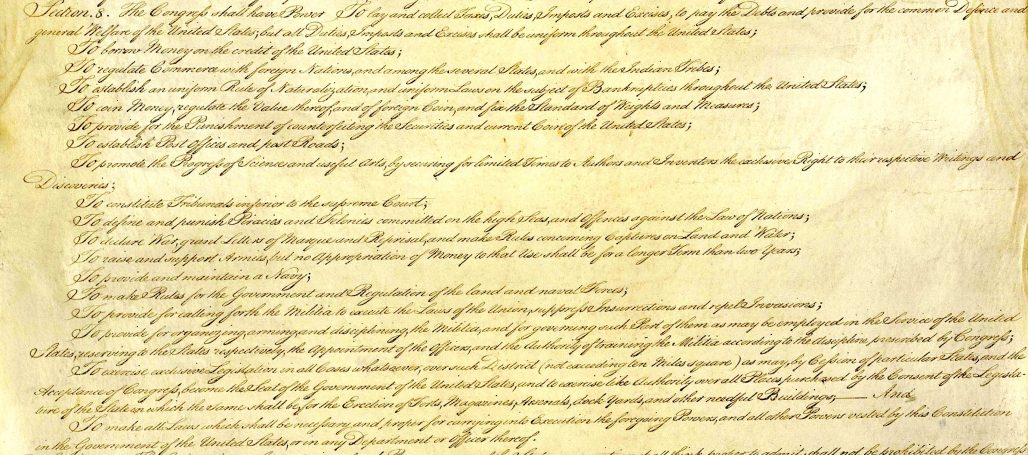Giving Trump Carte Blanche for War
A little-noticed Senate bill would give Donald Trump blanket permission to launch wars in violation of the Constitution, says John Kiriakou.

Note to readers: please click the share buttons above
Have you ever heard of Senate Joint Resolution 59 (S.J.Res. 59)? Neither had I. A friend of mine saw a blurb about it on an obscure national security blog and brought it to my attention. At first glance it didn’t seem to be any big deal. It’s inelegantly named the “Authorization for Use of Military Force (AUMF) of 2018.” It was introduced on April 16, 2018 by Senators Bob Corker (R-TN), the chairman of the Senate Foreign Relations Committee (SFRC), and Tim Kaine (D-VA). Officially, the bill would “Authorize the use of military force against the Taliban, al-Qaeda, the Islamic State in Iraq and Syria, and designated associated forces, and provide an updated, transparent, and sustainable statutory basis for counterterrorism operations.”
It’s hard to oppose a bill that would “keep Americans safe,” as Corker said in the SFRC hearing. But this bill is so bad, such an affront to our freedom, such an attack on our civil liberties, that we should be compelled to oppose it.
S.J.Res. 59 is bad for a number of reasons. First and most importantly, it would provide blanket permission for the president to launch a military attack of literally any size and intensity whenever he wants without specific congressional approval. That seems obviously unconstitutional to me, although I’m not a constitutional scholar. Still, the constitution says in Article I, Section 8 that only Congress shall have the authority to declare war, among other things military. It does not allow the president the ability to launch a war.

Congress alone has the power to declare war. Article 1, Section 8.
Second, according to Marjorie Cohn, professor emerita at the Thomas Jefferson School of Law and former president of the National Lawyers Guild, it also would write the president a “blank check to lock up Americans who dissent against U.S. military policy.” That’s right. If you oppose U.S. military policy, the president would have the right to lock you up indefinitely without charge.
Certainly, our government already does that. But we’re told that this happens to the worst of the worst—those terrorists who happen to be American, but who also have planned large-scale terrorist attacks against the country or its citizens or who have taken up arms against the United States. Think “dirty bomber” Jose Padilla or the a-yet-unnamed Saudi-American currently being held somewhere and being represented by the American Civil Liberties Union.
This is different. This would mean everybody would be at risk. It would mean you could be held in a gulag, incommunicado, if the White House doesn’t like your politics.
The reason this could come to pass is that, third, the bill is (probably unconstitutionally) broad. It says that the president may, “use all necessary and appropriate force” against Iraq, Afghanistan, Syria, Yemen, Libya, Somalia, al-Qaeda, ISIS, the Taliban, and their “associated forces” anywhere in the world and without limitation. But it doesn’t define what “associated forces” means, nor does it define a “co-belligerent,” someone acting in support of one of these countries or groups. It allows the White House to do that for us.
Fourth, unlike almost every other bill in Congress, this one doesn’t have a sunset clause, meaning it never expires. Congress, to remain relevant, almost always includes a sunset clause so that, if a law is working, it can be renewed. If it isn’t, it can expire. And if it’s flawed, it can be fixed. This one would just go forever.
Several weeks after the bill was introduced, the Center for Constitutional Rights (CCR) wrote a letter to Corker and to SFRC ranking member Senator Bob Menendez (D-NJ), another S.J.Res. 59 supporter. CCR said that it had “grave doubts” about the appropriateness and the constitutionality of the bill, and that the bill would “hand over broad authority to expand war—that should reside with Congress—to the executive.” CCR continued that passage of the bill would “complete the erosion of congressional war-making authority set in motion by the 2001 AUMF” passed in response to the September 11, 2001 terrorist attacks.
Representatives Walter Jones (R-NC), the former chairman of the House Armed Services Committee, and Barbara Lee (D-CA) issued a letter to the SFRC saying that,
“The Corker-Kaine proposal would further limit congressional oversight of our perpetual wars. Replacing one blank check with another even broader one is a recipe for disaster.”
While conceding that some sort of military authorization is probably necessary, Jones and Lee added that any new bill must include a sunset clause; it must repeal the AUMFs of 2001 and 2002, which also had no sunset clauses; it must be mission-specific; and it must be transparent.
This terrible bill is stuck in the muck of the congressional process right now. As the months tick by, there’s a greater and greater likelihood that it will simply die. But that doesn’t solve the problem. The problem is that Congress is generally made up of lemmings and cheerleaders for the military/industrial/intelligence complex. They do as they’re told, whether it’s by their leadership or whomever happens to be sitting in the White House. That’s bad for the country. It’s bad for the constitution. And it’s bad for future generations.
There’s an old saying in Washington. “Don’t kick a man when he’s down. But if he’s already down, don’t stop kicking him.” Now is the time to kick this bill until it’s dead.
*
John Kiriakou is a former CIA counterterrorism officer and a former senior investigator with the Senate Foreign Relations Committee. John became the sixth whistleblower indicted by the Obama administration under the Espionage Act – a law designed to punish spies. He served 23 months in prison as a result of his attempts to oppose the Bush administration’s torture program.

